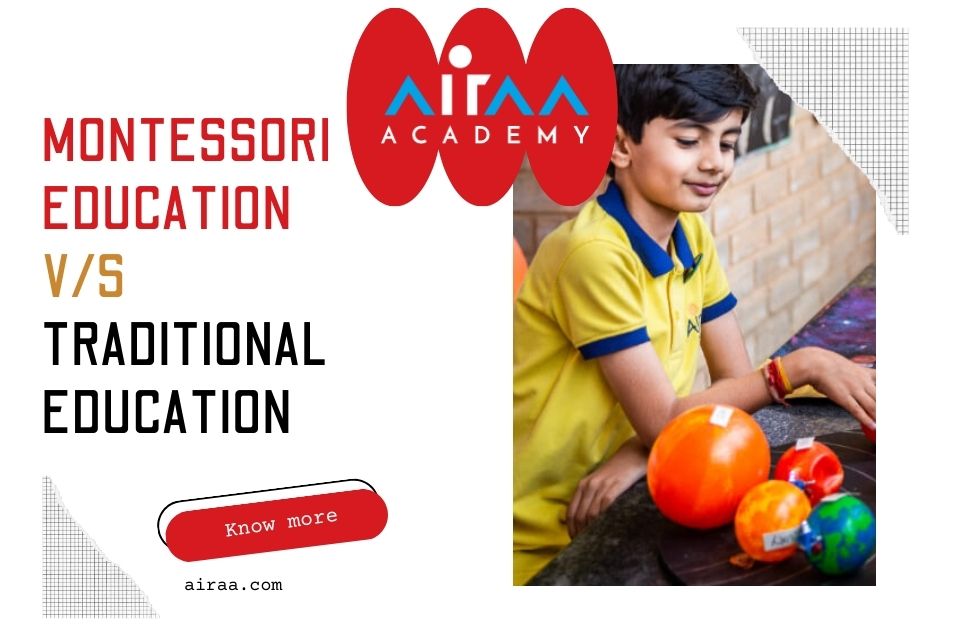With so many alternatives for education, picking the ideal place to send your child to school can be difficult. Elementary school is much more than a daycare program, and institutions have developed to satisfy the growing demand for early childhood education of better quality. Elementary Montessori schools and preschools fill this need.
If you are looking for the best elementary Montessori in South Bangalore, you have come to the right place.
Difference Between Montessori and Traditional Schools
You may have heard that there are benefits to elementary Montessori over conventional / traditional elementary school programs. Here are some major distinctions between Montessori schools and conventional schools to aid in your decision-making.
Montessori is a Learner-Centered Approach to Learning
The primary distinction of Montessori philosophy is its focus on the needs of the learner. Why does that matter? All learners have various strengths and interests, and they all develop at different rates. A Montessori education uses observation to follow learner’s interests, as opposed to a traditional education where every learner in the class must follow the same path laid out by the teacher.
The Curriculum is Adaptable in Montessori
Every learner is unique. This reality is reflected in the flexible curriculum used in Montessori schools, which allows each learner to proceed at their own pace. Every learner is directed toward a specific learning objective that is specific to their age group (0-3 years, 3-6 years, 6-9 years, etc.). The lesson that each learner chooses to learn is up to them, and facilitators monitor each learner’s development throughout time. In contrast, the traditional curriculum requires all pupils to travel down the same route.
Play is Learner’s Job in Montessori
Elementary schools, both conventional and Montessori, place a strong emphasis on play. Traditional elementary schools, on the other hand, allow learners to play in an unstructured style, whereas in a Montessori environment, play is regarded as a learner’s “job.” The materials available in the environment are an aid to the learner’s learning.
Active Vs. Passive Learning
Learners in a conventional setting are passive learners. They listen to the teacher’s lecture while seated in rows. Learners in Montessori programs engage in active learning. They engage in practical exercises and learn by doing. Learners can touch, feel, and experience everything around them through hands-on activities.
A Montessori learner, for instance, might construct a model of the solar system to learn about it. In a traditional classroom, learners might study the solar system by looking at graphics in a textbook and hearing the teacher discuss it. Generally speaking, active learning is more efficient than passive learning.
Mixed Age in Montessori Classrooms
Age-grouping is done chronologically in traditional schools. Learners enter classrooms with peers their own age and advance to the following grade level together. The acceptance of mixed age groups in Montessori classrooms is a significant distinction between traditional and Montessori elementary schools. One advantage of this is that older learners get the chance to mentor younger learners and help them develop their skills in a loving and caring way. Collaboration is highly encouraged, which aids learners in building effective social skills.
Class Size
The facilitator-to-learner ratio is typically lower in elementary Montessori school classrooms than it is in conventional classrooms.
The Role of Facilitators in Montessori
The facilitator’s role in the classroom is one of the key distinctions between an elementary Montessori school and a conventional one. In a more conventional context, the teacher uses a strict time schedule to guide pupils’ attention from subject to subject. The facilitator in a Montessori preschool serve as facilitators of learning. The choice of which project to work on is left up to the learners, who are free to switch between them. Instead of striving to rush through things to be on schedule, they are able to study at their own pace and stay focused on a task or skill until they have mastered it.
Facilitators Follow the Learners in Montessori
Facilitators set up the classroom for the learners rather than preparing the learners for the classroom. Every learner has a special potential that Montessori facilitators reveal through observing learners, their interests and levels of comprehension. They maintain track of learner progress, level of preparation, and topic preferences so that they can later refer to the data while planning the day’s curriculum.
Benefits for Learners with ADHD or Autism Spectrum in Montessori
Learners who have ADHD or those who are autistic benefit from environments with established schedules. The Montessori classroom is more orderly and has fewer distractions than the normal traditional school classroom. The Montessori idea of modelling behavior benefits all learners, including those on the spectrum or those with ADHD. Learners with autism will be better equipped to interact in social situations since empathy and social skills are part of the de facto curriculum.
Learners are Self-Motivated Learners in Montessori
The freedom to work at their own speed on projects of their choice that elementary Montessori school pupils are given, allows them to follow their passions and develop a better understanding of particular subjects. As a result, they are inspired to learn and become self-driven lifelong learners.
Together, let’s create something amazing
Our goal at Airaa Academy Montessori School, South Bangalore is to cultivate in our learners a passion for learning that will last a lifetime. Contact us right away so that we can work together to create something amazing for an early childhood education program for your child.
Airaa Montessori is the best Montessori school in South Bangalore and also the best elementary Montessori school in Bangalore. Feel free to ask any questions regarding Montessori education and traditional education.






